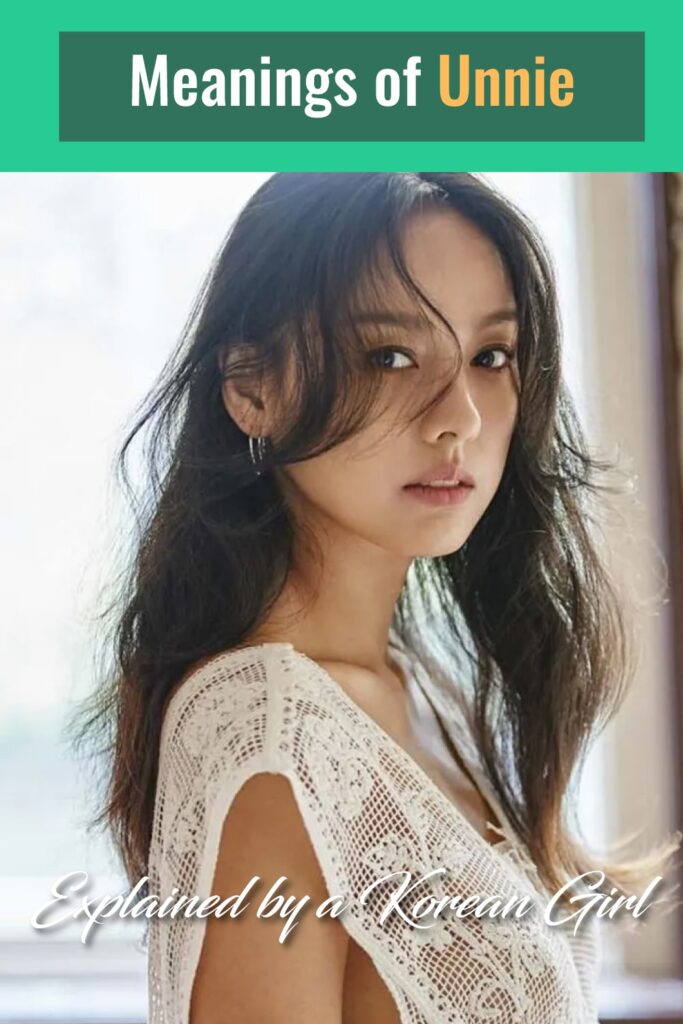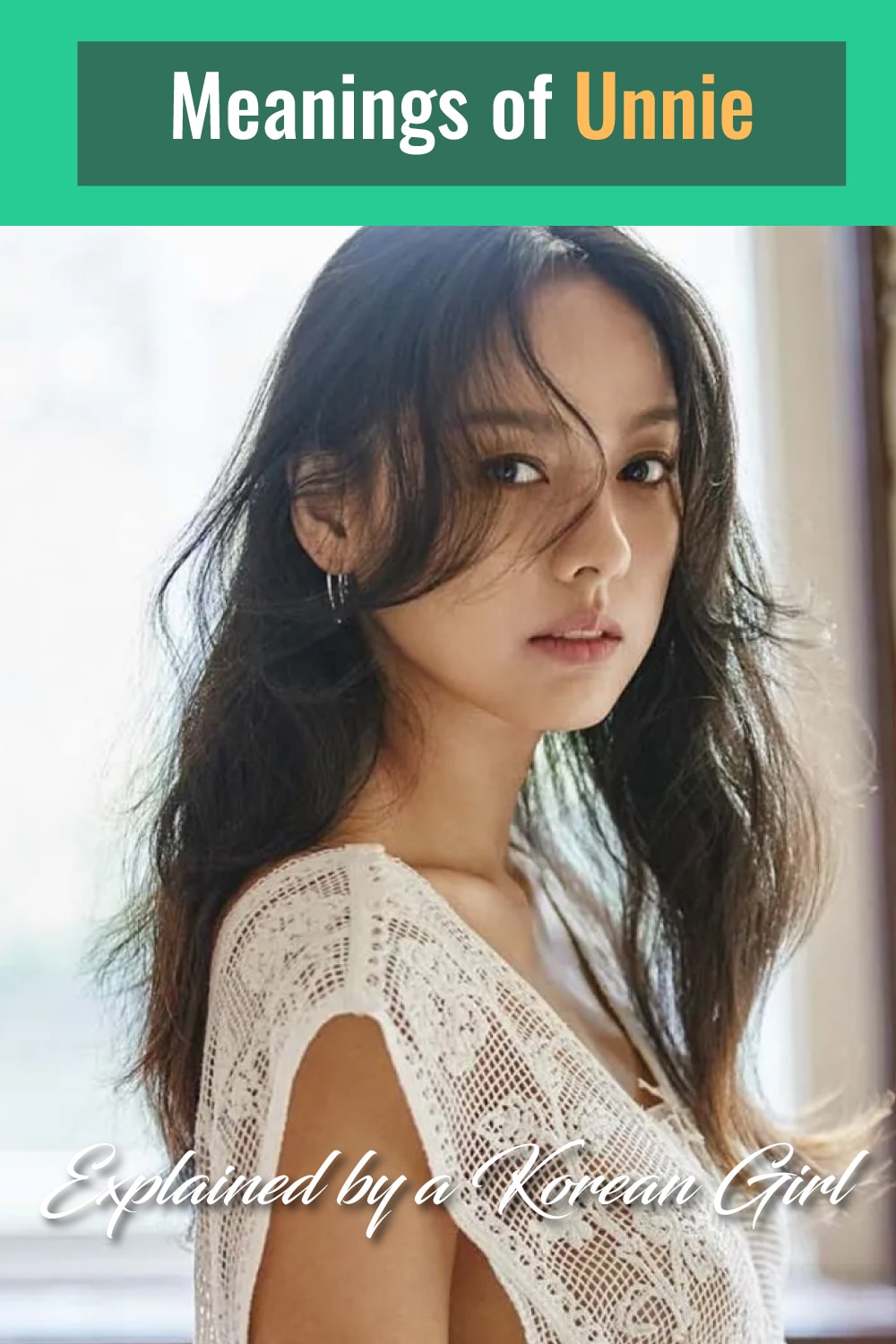
Not sure when to call someone unnie?
Find out its many meanings and how to use them below!
We also cover:
- cultural background of unnie
- how to keep a good unnie
- and more
Unnie can like or dislike you regardless of what you do. Good ones are fun female friends who have your back in tough times. Some will treat you like their own younger sister.
Let’s get started!
Unnie means older sister and is used only by women.
Korean has a unique system of referring to siblings that changes depending on relative age and gender. The five ways are:
These are used daily to refer to people outside of your family as well.
For example, you may call an older female classmate “unnie” in some situations, even though you’re not related.
Having an unnie can be super fun. Find out the pros and cons below!
Unnie vs. Eonnie vs. Unni v. Onnie
Unnie has the most spelling variations among kinship terms in Korean. They all mean the same thing, but “eonnie” is the correct spelling according to romanization rules, while “unnie” is another acceptable version. You might also see “oni” and “uni”, which aren’t so common.
For the purpose of this article, we’ll use the word unnie since it’s more common.
What does unnie mean in Korean?
Unnie means “older sister”, but is only used by women. There are other situations where the word is used.
1. Actual sister
To emphasize that someone is your own sister, you add “chin” or “woori” before unnie: chin unnie or woori unnie.
2. Oppa’s wife
You can call your oppa or older brother’s wife, “sae unnie“, which literally means new unnie. This doesn’t sound mean like it would in English.
3. Female relatives and cousins
You can call older female relatives such as cousins, “unnie”.
An older female cousin in Korean is “sa-chon unnie”, but you don’t call her that. Instead, you can call your sa-chon unnie by “name + unnie” or simply “unnie”.
You refer to her as “sa-chon unnie” when speaking with others.
About Korean Age
Age in Korea is calculated according to these rules:
- Everyone is 1 year old when they’re born since time spent in the womb counts.
- Everyone ages 1 year on New Year’s Day, January 1st.
When in doubt, compare birth years instead by asking “myut-nyun-saeng-yi-seh-yo?” to get a quick idea of what to call someone.
4. Older female friend or acquaintance
You can also address an older woman in a friendly way by calling her unnie.
- Example: 아는 언니 (Unnie that I know or acquaintance unnie)
There’s a special exception at restaurants or pubs where men over 60 can call female servers unnie, which sounds friendly.
5. Female upper classmates
If you’re a girl in school, you start calling older females by “name + sunbae”, which is gender neutral. After you become more familiar with each other, you can call them by “name + unnie”.
- Example: Hyori sunbae → Hyori unnie
6. Pretty or cool females (mostly celebrities)
If someone is really pretty or cool, girls call them “unnie” as a sign of respect.
7. Close female friends
Close female friends jokingly say “unnie” to each other with aegyo, even when they’re the same age. This is usually done by the one asking for advice or saying thank you for a free meal.
It’s to spice things up and should be used only sometimes for fun.
Insider Tips
- Women like to call older females or sunbae “unnie” as long as they feel comfortable and like each other. Unnie sounds nice, friendly and non-flirty unlike oppa.
(Some women refuse to call male sunbae oppa to completely prevent flirting) - Female customers call female staff in a clothing store “unnie” whether she’s older or younger. Sometimes customers and staff both call each other unnie. If the age gap is large, female customers refer to staff as “emo (or auntie)” or “sajangnim“.
- Unnie is portrayed as a strong or charismatic person in Korean media.
- Jessi, Ra Mi-ran and Kim Sook were called “ssen unnie (or strong/charismatic unnie)” on Sister’s Slam Dunk.
- With the concept of ssen unnie who help their dongsaeng get a refund (getting a refund is not a given in the motherland), Refund Sisters was formed on the variety TV show, Hangout with Yoo.

What’s the cultural background of unnie?
In Korea, sisters tend to fight a lot from teens to early twenties.
They may get along well like best friends, especially if they’re in the same fan club. On the other hand, if their favorite K-pop idol groups are rivals, they’ll fight as well.
Just like all brothers and sisters, the relationship between dongsaeng and unnie is pretty bad during puberty. Unnie is stressed out by their younger sister’s behavior and is quick to yell at her. Dongsaeng dislikes unnie’s commands and meddling, so she fights back.
Common Korean Words and Phrases you Need to Know
Unnie and dongsaeng usually argue by saying, “she used my cosmetics/wore my clothes without permission”, “she ate my cake”, etc.
However, sisters argue less and less as they enter adulthood and get closer. Unlike siblings and brothers who become distant during adulthood, unnie and dongsaeng mostly maintain their friendship.
Most of my friends are very happy to have their unnie because they can share many things. (They’re especially ecstatic after both getting married and having kids, since they can share even more.)
What it’s like to have unnie
I don’t have a biological unnie, but I grew up with my best friend having one.
From my 20+ years of observation across the street, they used to fight a lot in school mostly about clothes, then became super-duper close, especially after they both got married and became moms.
My friend and her unnie now say that they’re ecstatic to have sisters more than anything.
(Honestly, I wish I had a sister too. Oppa is nice, but there are more things you can share with an older sister.)
Having an unnie of my friend is the best, since she’s been unconditionally kind and nice to me, sometimes more than to my friend (probably just on the surface, but still, I’ll take it!). Unlike some judgy jealous type of unnie from school or your major, they’ll treat you like their own sister and root for your journey.
Meanwhile, I also had some undesirable experiences with unnie at high school and uni. Some thought I wasn’t polite because I didn’t bow 90-degrees every time I encountered them.
The bottom line is unnie can be nice or horrible just like every other human interaction. My advice is that you don’t need to care too much about the negative ones. Because some like you no matter what, and some don’t for no reason.
How to use unnie when you first meet someone
You CAN use “unnie” during the first casual meeting once everyone reveals their age (Koreans casually ask how old you are to determine how to address you.)
Unnie sounds really nice and friendly, so no one will get upset when called unnie.
However, it sounds unprofessional to call someone you met at or through work “unnie”. In this situation, it’s better to call them by either their “job title + nim”, “last name + title + nim”, or “first name + title + nim”. Nim is to add honorifics. Examples are “daerinim”, “Park daerinim” or “Yujin daerinim”.
How to make unnie honorific?
Showing the right amount of respect can be tricky for Korean language learners.
There are two levels of kinship terms, plain and honorific.
The honorific suffix “-nim” is the most common way to make a word honorific. But, it’s never used for unnie.
What does unnie do for you?
For biological sisters:
Unnie, like hyung, feel a bit pressured to take care of you. They’ll pay for meals and give beauty, life and dating advice. Unnie help you resolve issues if you’re in an unfair situation, or help you get a refund from a store if you’re too shy.
Many unnie influence their younger sisters in terms of fashion style, major, etc. Unnie also take you to cool places like trendy cafes or shopping. It’s nice to have unnie since you can share pretty much everything, including hobbies, attire and perfume.
Although unnie get mad if you use their expensive clothes, purses or shoes without permission, they’ll still love you and don’t tend to beat you up like hyung. But still, unnie can boss you around.
In Korean culture, unnie get married first unless she chooses to be single. If younger sisters or dongsaeng have a wedding before their unnie, it’s considered very inappropriate and almost as a betrayal.
For younger friends:
Having a nice unnie is awesome because they’ll provide a feeling of sisterhood and a lot of good life advice. However, it’s also a double-edged sword that you need to be careful of.
Finding a nice one is very hard. Some easily get jealous of you and backbite. (Not all, but some unnie dislike younger females just because they’re younger as aging is viewed negatively there.) On the other hand, once you get to know kind and loving unnie, they’ll be nice to you unconditionally and you can tell them anything.
What do you do for unnie?
When unnie buys you a meal, you can pay for coffee after. Also, giving them delicious desserts or birthday gifts will help you win their heart.
Once unnie like you, they’ll tell you to talk casually. It’s easy to make mistakes (being too familiar and disrespectful) when you feel too comfortable. Just make sure to show some respect because if unnie feel like you’re looking down on them or being rude, you might actually lose them.
FAQ
What is sister in the Korean language?
What you directly call your sister in Korean depends on your relative age and gender.
- If you’re younger than your sister and female: unnie
- If you’re older than your sister and female: their name or nuh which means “you” in casual speech
- If you’re younger than your sister and male: noona
- If you’re older than your sister and male: their name or nuh which means “you” in casual speech
What’s the difference between Unnie and Noona?
Both Unnie and Noona mean an “older sister” in Korean, but Unnie is used by women and Noona is used by men.
When can I start calling an older female Unnie?
Not when you first meet, but after a few interactions and some rapport is built. It’s a good idea to ask them first as well.
What’s the acceptable age gap to call an older female Unnie?
1-10 years is a good rule of thumb. Some women might not like being called unnie if they’re only a year older than you. When in doubt, ask.
What’s unnie in Satoori?
The most well-known satoori (dialect) for unnie is unniya used in Busan and Gyeongsang-do.
Learning Korean
Guided conversation is the fastest way to get fluent in Korean. Pimsleur takes you from 0 to conversational in three months. You can try Pimsleur here for free!
Did we miss anything?
Let us know your thoughts on unnie in the comments!
Disclosure: There are affiliate links in this article that provide us a small commission at no extra cost to you. We only endorse the best software and products we use ourselves. Find out more about our code of ethics.









Can unnie mean girlfriend?
Hi Joanne, not as far as I know.
But this could have changed though. 🙂
This is very informative and thorough, thank you for your writing. 🙂
Hi Zee,
Thank you so much for the kind words! ^^